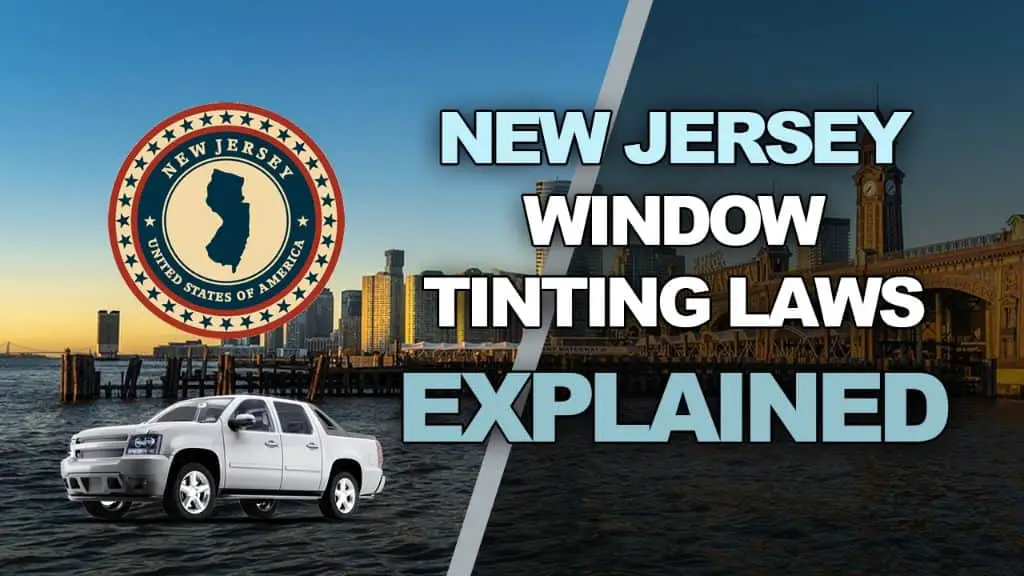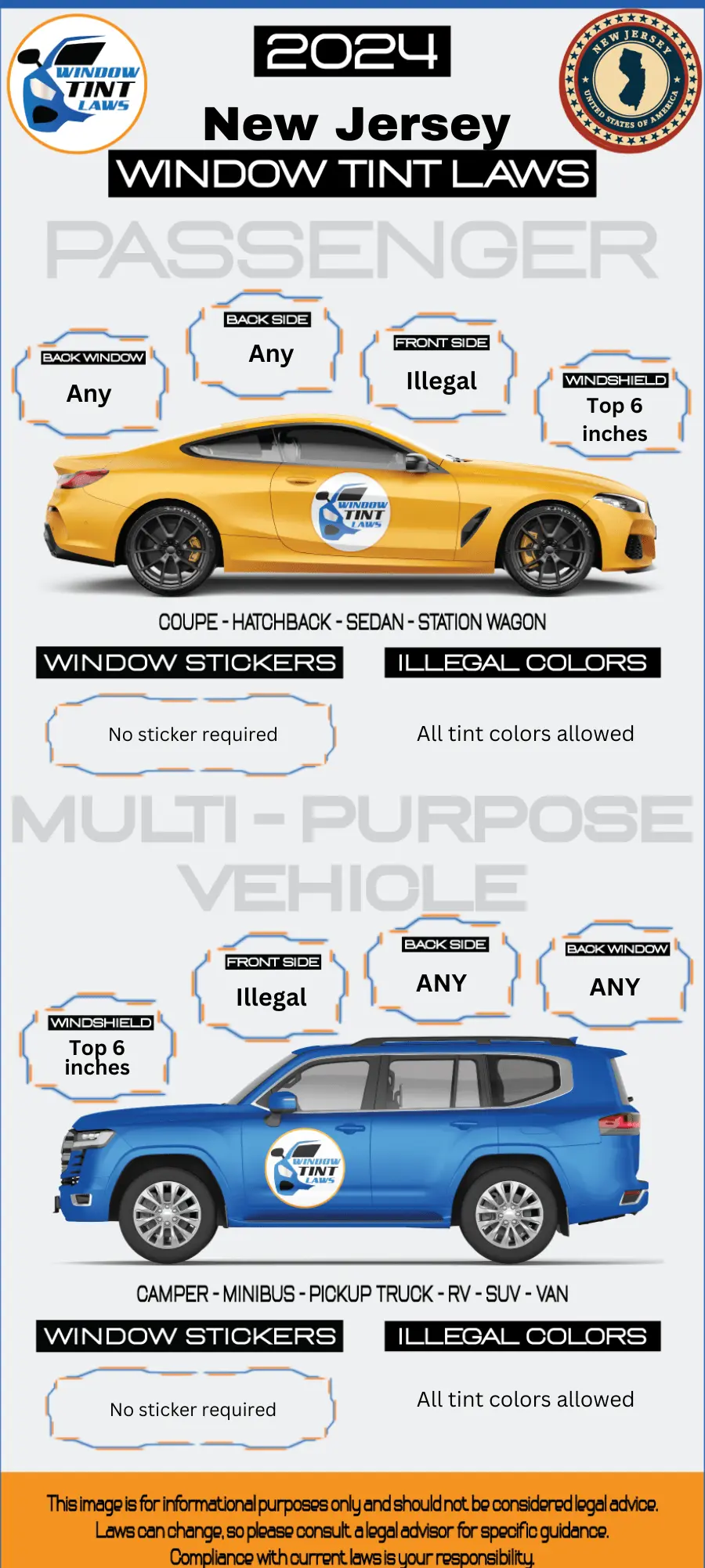

Article Created by Ryan Pietrzak
Last updated on February 14, 2024New Jersey Tint Laws – 2024 Updated Legal Tint Limit
Please note that New Jersey Tint Laws Regulation can change daily and may be interpreted differently at the city or county level. We recommend verifying this information with your local DMV or law enforcement agencies. We have manually fact-checked this content using official state resources. New Jersey enacted tinting laws in 2003. If any information provided is incorrect or outdated, please contact us so we can make the necessary corrections. Thank you.
2024 New Jersey Tint Laws – Legal Tint Limit For Passenger Vehicles
- Front Windshield: Tint on the windshield is not allowed, except for the top 6 inches
- Front seat side windows: It is ILLEGAL to tint this window
- Back seat side windows: Any tint darkness can be used
- Rear window: Any tint darkness can be used
2024 New Jersey Tint Laws – Legal Tint Limit For Multi-Purpose Vehicles
- Front Windshield: Tint on the windshield is not allowed, except for the top 6 inches
- Front seat side windows: It is ILLEGAL to tint this window
- Back seat side windows: Any tint darkness can be used
- Rear window: Any tint darkness can be used

- Medical exemptions: New Jersey tint laws permit darker tints on front side windows with a doctor’s note
- New Jersey tint law prohibits metallic or reflective tint on any of the windows
- New Jersey tint laws is statewide with no additional local regulations
- Violating New Jersey car tint laws can lead to fines of $50-$150 for a first offense.
What does VLT Mean according to New Jersey Tint Laws?
- Window tint film’s light transmission is measured as VLT (Visible Light Transmission) and each state has its own legal limits for VLT on car windows.
- A HIGHER VLT means that more light is allowed to pass through the window tint film.
- Example: a 75% tint will allow 75% of the light to pass through whereas a 5% tint will only allow 5% of the light to pass through, making the 5% tint a much darker film.
- New Jersey window tint laws has specific VLT limits for Passenger Vehicles and Multi-Purpose Vehicles.
FAQ’s Regarding New Jersey Tint Laws and New Jersey Legal Tint Limit
What is the darkest legal tint in New Jersey?
In New Jersey, the law is quite strict regarding window tint. No tint is allowed on the front windshield, and only a strip on the top six inches of the windshield is permissible. For the front side windows, no tinting is allowed, meaning these windows must be clear. However, the rear side windows and rear window can have any darkness of tint, provided the vehicle has outside rearview mirrors on both sides.
Are police exempt from window tint laws in New Jersey?
Yes, in New Jersey, police vehicles and other law enforcement vehicles are generally exempt from the state’s window tint laws. This exemption allows these vehicles to have window tint that is darker than what is legally permitted for regular passenger vehicles.
How do I get a tint waiver in New Jersey?
In New Jersey, obtaining a window tint waiver for medical reasons involves submitting a completed application along with a physician’s statement. This statement must certify that you or a regular passenger in the vehicle has a medical condition requiring protection from sunlight or bright artificial light. The application and physician’s statement should be submitted to the New Jersey Motor Vehicle Commission (MVC). If approved, the waiver allows for window tint that is darker than the standard legal limits. However, it’s important to note that New Jersey has strict regulations on window tinting, and exemptions are typically granted only under specific medical conditions.
How much is a tint ticket in New Jersey?
In New Jersey, the cost of a ticket for a window tint violation can vary, but it typically ranges from $54 to $100. The exact amount depends on the specific circumstances of the violation and the discretion of the issuing officer. Repeat offenses may result in higher fines.
Can you get pulled over for tint in New Jersey?
Yes, in New Jersey, you can be pulled over by law enforcement if your vehicle’s window tint is suspected to be in violation of the state’s strict tinting laws, particularly for the front side windows and windshield where no tint is generally allowed. This could lead to a ticket or a requirement to remove the non-compliant tint.
How to get a Tint Exemption in New Jersey
New Jersey permits medical exemptions. Windshield and front side windows may have below 70% and 35% VLT respectively. Conditions include ophthalmic or dermatological photosensitivity, chronic actinic dermatitis, photosensitive eczema, and skin cancers having an associated diagnosis of chronic actinic dermatitis.
A medical exemption certificate must be in the vehicle at all times. Label with name of sun-screening material or product manufacturer and registration number of facility that installed the tint must be displayed on windshield and front right side window. Tint film installed due to medical waivers must be removed prior to the sale of the vehicle.
For more information regarding window tint medical exemptions in _____ you can check out this resource:
- New Jersey Motor Vehicle Commission – Window sun-screening for medical reasons
- New Jersey Motor Vehicle Commission – Application for Sunscreening (.pdf file – NEW form)

Ryan Pietrzak
Creator of Windowtintlaws.us
